Memoirs of walking down to the ravine from the Mehli village in Shimla, Himachal Pradesh
I’m charged right now. As charged as I can be. I’m seated on dry pine needles and grass. A group of mosquitoes buzz in front of me. But I don’t care. For I’m listening to the sweetest sounds of chirping birds and the rhythmic music of freshwater falling on stones. We have driven to a jungle spot to work and write. There has been no power since morning in our remote stay in the mountains near Mashobra village of Shimla. Our village is probably called Gagal and it is near Mohanpur, that’s all I know about our whereabouts. Our host told us the electricians are fixing the cables, and we would only get power by five, maybe a bit before.
It was only 2 pm. My Mac was at 18% and my husband’s Mac was discharged. He has a big release today so he needed electricity immediately. You know what he has done to ensure he never gets out of power? He has purchased a car charger that loads up electronics from the car battery. We are perfectly remote and nomadic in every sense.
After a small lunch, we drank a cup of strong Coorgy coffee each, I postponed my nap, packed our bags with water, toilet paper, sweaters, chargers, laptops, and phones, and set on our journey. From our valley abode, we first climb up fifteen minutes to get to the car parking. We could have kept our car with the house but the road to this place is kachcha and broken. The road is not made up of tar but its loose stones spread on mud. There are depressions filled with stones in the road everywhere. While trying to bring our car up, our wheel had gotten stuck in loose soil and it just whirled in the same spot for ten minutes. Then we decided not to play it tough and turned around and drove uphill in the direction from where we had come. Our host helped us keep the car at the top with a big resort.
What otherwise would have been a nerve–wracking drive on a narrow, zigzag 3.5 km stretch now only takes us ten minutes by a steep walking trail. Hauling up our nine-kilo laptop bag on my back, I bent down to support the weight and finally understood why the local women carrying dry grass on their backs are always so stooped. If only instead of a blue khadi kurta and Nike shoes I had worn a thick kurta salwar, cloth shoes, and tied a scarf on my head, I would have looked Himachal-born.
Within fifteen minutes, we reached our car. It was decided between us that we would park it only in a groove from where a jungle trail could bring me to a peaceful spot. There I would sprawl and write. We drove upwards. But I had completely forgotten that the quaint pine jungle trails I had identified on the previous evening’s walk lay downwards from that big hotel, not upwards. On this mounting road we didn’t see any comfortable parking spots next to forest land. We kept driving.
At one deep curve, a road roller had blocked the road. It went up and then within a minute we would see it descending down slowly. Another car was stopped in front of us, and one more soon parked behind. We waited. First, we wrongly assumed that the road roller wasn’t able to ascend but soon we had no doubt he was just making the road. In fact, the stretch on which we stood was freshly prepared and shined black. When the work didn‘t seem to stop, we turned around. By this time I had connected the laptops with the car charger. And how speedily they started loading up.
We turned around and drove down. My husband showed me many curves where a car could be kept but none had a peaceful forest around it. Finally, he stopped at a wide bend where we could park completely off the road and a deep jungle sprawled behind the loop. Within half an hour the thing had spiked up my laptop from 18% to 50% while my husband’s Mac was also being charged. Amazing!
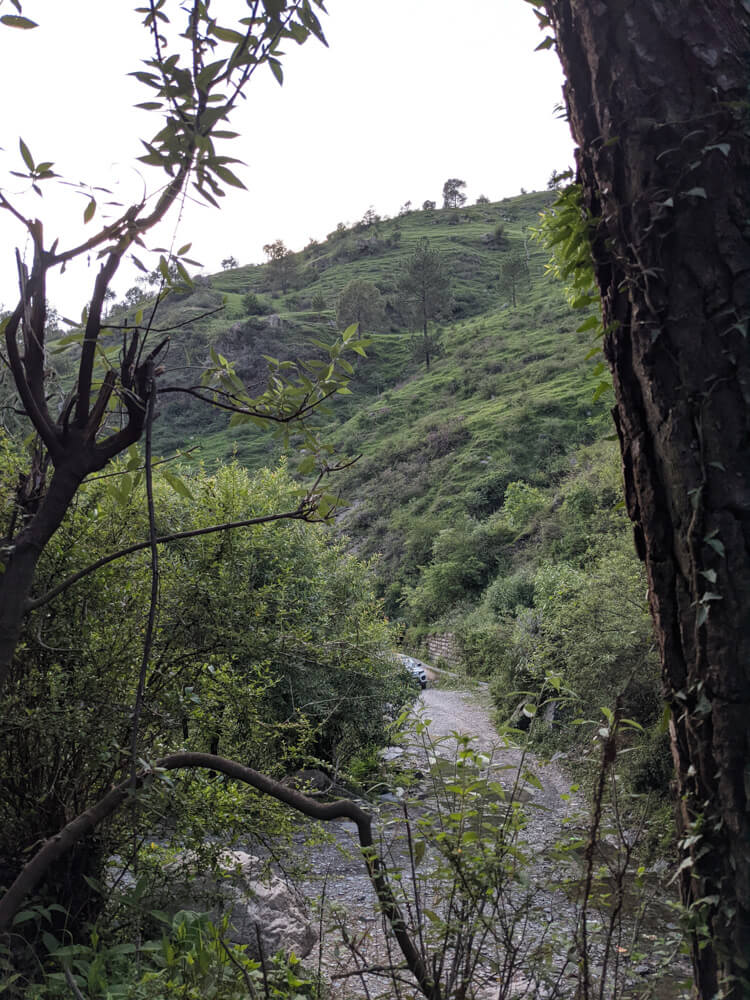
My partner jumped on calls, and I took my laptop and a small sling black leather bag that has stood with me since —what seems like— eternity. I had put water, tissues, notebook, pen, kindle in it, and I don’t even remember now but the bag always has a matchbox, sanitizer, pens, digene, disprin, car keys, and a whisper sanitary napkin. How can I be any more prepared?
After walking a bit upwards from the loop, I crossed a water stream flowing down the rocky road. It was a natural water flow since further up I saw the water being collected in a large concrete tank from which multiple iron pipes ran. Later our host told us we get our water supply from the same source.
Above the fall of the water, big rocks stood towering. From there another kaccha road rose uphill. There were obscure walking trails too. At the top, I could see one or two houses. I went further behind the tank and found myself in the middle of jungly bushes and pine and deodar trees. Away from the water source, pressing my Mac laptop between my armpit and the rib, I balanced myself and quickly peed. No one from the road could see me but if a wayfarer or a villager happened to come there, she would have found me. I had to rise carefully so as not to spoil my clothes with period blood. If my pee adventure was not acrobatics, I don’t know what is.
I walked around a bit more. Finally, I chose to sit under a pine tree on a needle–covered patch above the two big rocks nestling the water stream.
Here I am seated. My husband is in the car taking calls and charging everything he owns. He is funny when it comes to electronics but I appreciate him because he understands me and knows how desperate I get to be in nature. My body prefers grass and ground over carpets and concrete. I can’t help but be grateful for such a kind partner.
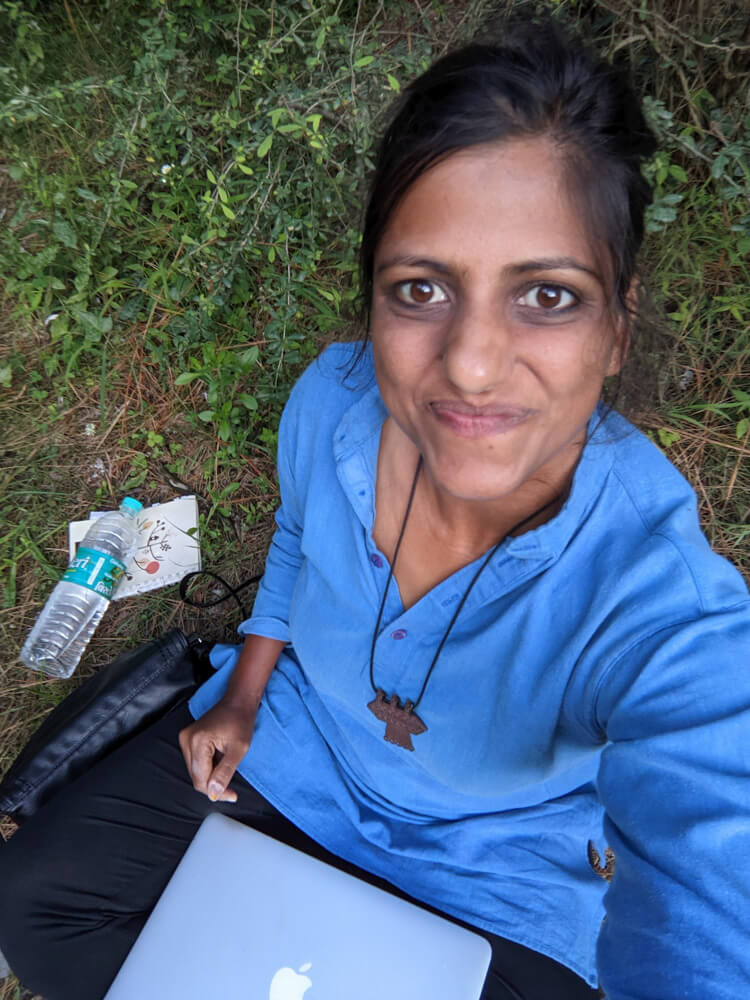
From this almost secluded corner where my ears make merry with this calming sound of the constant gush of water, I will tell you the tale of the day we went down into the ravine near Mehli. I have already written a lot about the Mehli Shimla village but I have yet to describe this walk to the water stream in detail. With my narration of the jungle walk, I hope to help all those who love to venture into the Himalayas on their own.
Since the day our Mehli host’s uncle had told us we could walk to the bottom of the valley, that means we could go all the way down the hill, to see the water stream there, I had decided that we wouldn’t miss the adventure. My partner knew better than to resist.
“Which trail could we take?” We asked.
“Further beyond our fields goes a mud path that will go down.” The Uncle of our young host said.
“Won’t there be leopards there?” The entire village had told us how the bagh frequently picked up dogs from outside their homes at night. They were sure that the wild ones live in the gorge below.
“They don’t bother humans. They are shy by nature and leave as soon as they see one. Just don’t go in the dark.”
On our first walk, we tiptoed on the edge of our host’s fields and then clambered down a mud trail curling through the slope of the mountain. We descended until we came to two rocks, one above the other, jutting out of the green and muddy precipitous hill. Seated upon them, we could see the entire valley. But we couldn’t still see the bottom where the river flowed. Locals call the brook khad or nallah.
As the sun had just gone behind the peak in front, the valley bathed in soothing golden twilight.
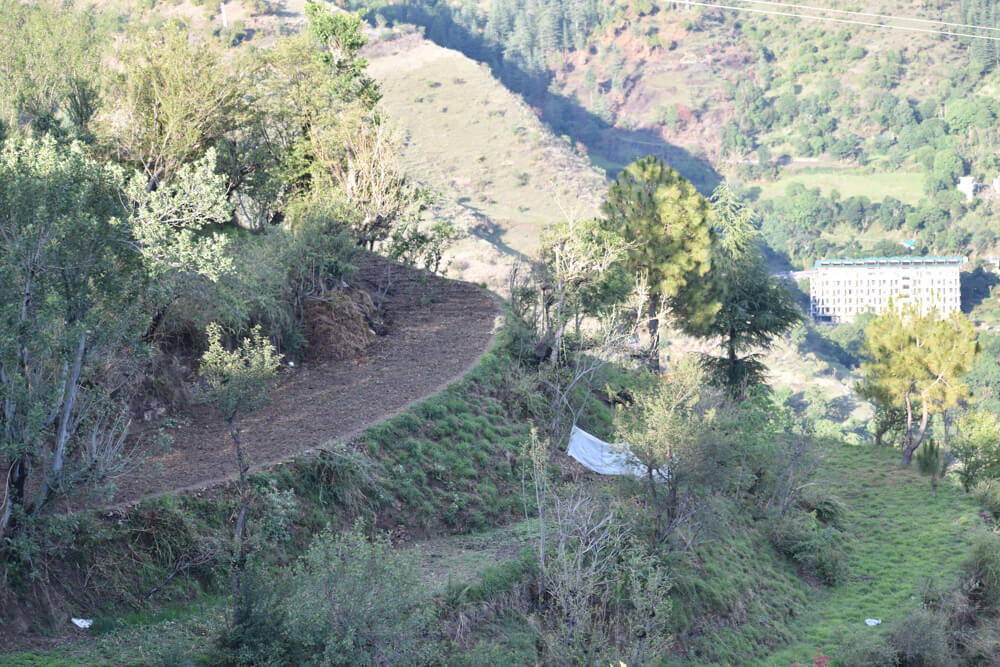
From that edge of the hill, we saw the dense village of Sanjauli clutching onto the top of the mountain in front. On our left, the view was blocked beyond a bunch of protruding pine trees. Under the Sanjauli village, between our hill and Sanjauli’s, a mountain was cut to make a road for construction material vehicles. Later we would come to know the road had supported the now halted construction of a four–lane highway.
On the right of the construction road, lay many mountain homes with their fields, forests, and trails, each far from another. Some of them were connected with a road and some only had mud trails leading to their doors. Our host’s uncle told us those homes have been there for many generations. On our right, the valley stretches on like infinity, a never–ending continuum of homes, paths, fields, pastures, pine and deodar jungles, and so on.
I felt so peaceful on the green slopes that I didn’t want to return home.
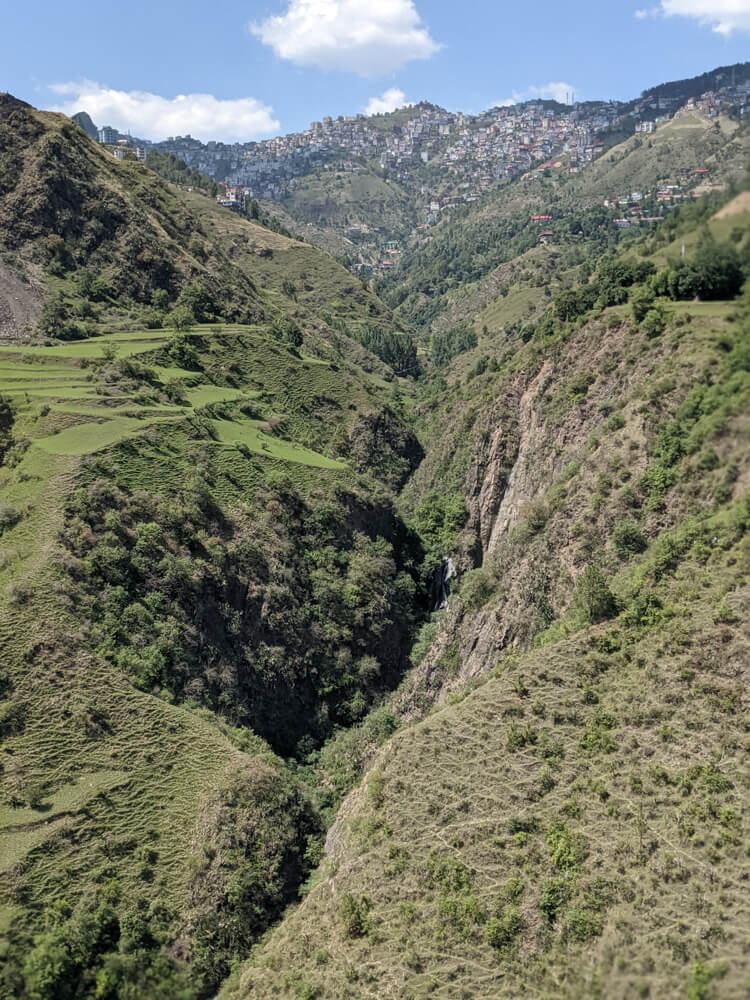
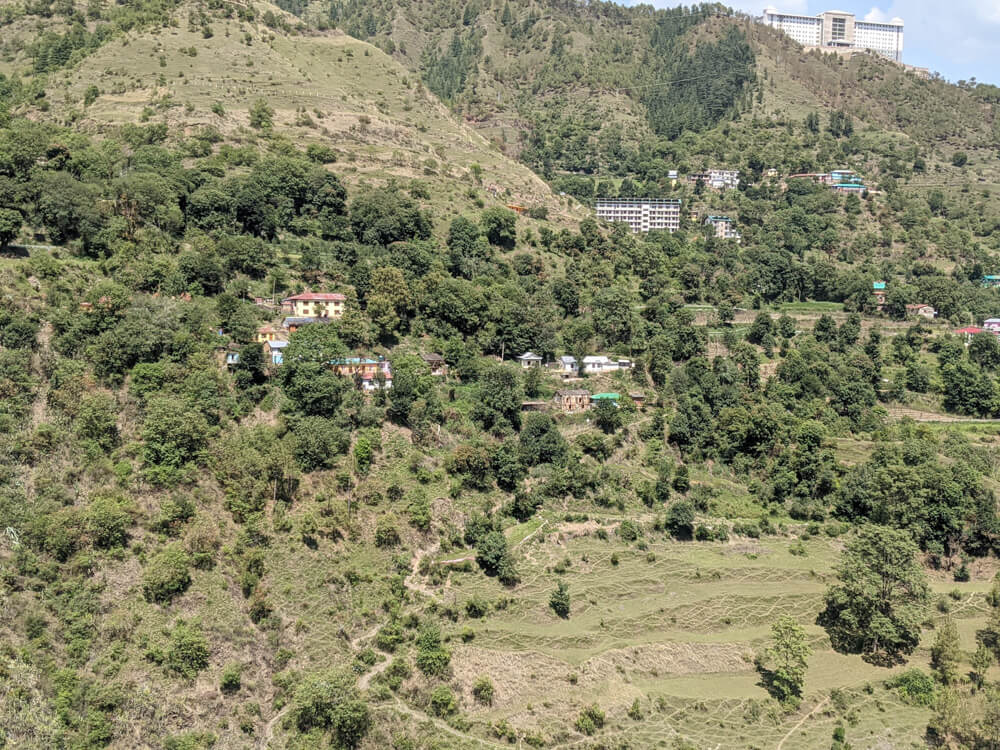
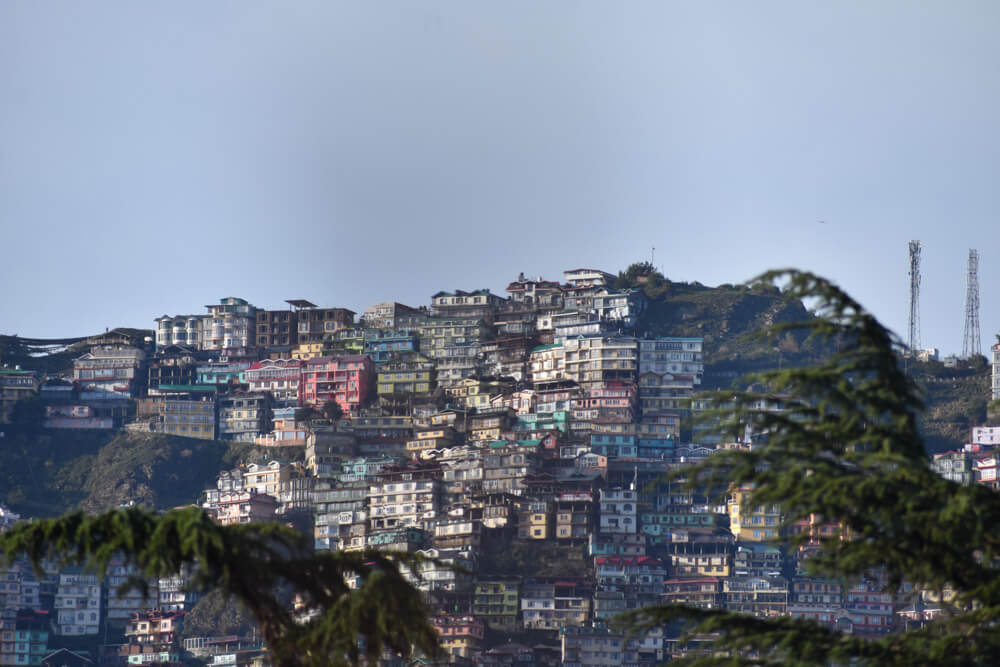
From that day on whenever we crossed the fields, we made sure to walk a little bit more further down every time. Sometimes we took our laptops and notebook along, and with this ethereal view in sight, I wrote in longhand, and my partner worked. Or sometimes I read, he took calls. He seated on the rock above me, and I on the rock below. Or we found a patch of flat land and spread. At the end of the day, we would bring our Kashmiri flask filled with ginger tea and savor it with the landscape. Other days we packed a bunch of samosas from the home–cum–eatery next doors and snacked on them while feeling we are the luckiest beings alive.
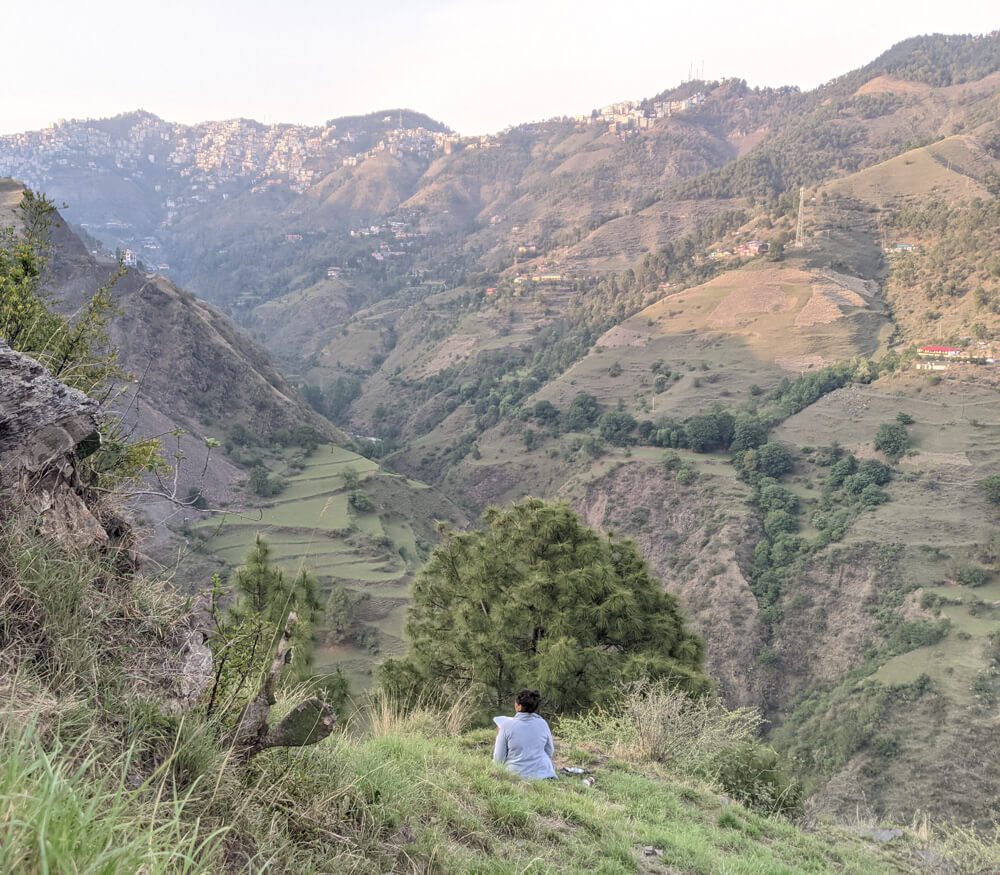
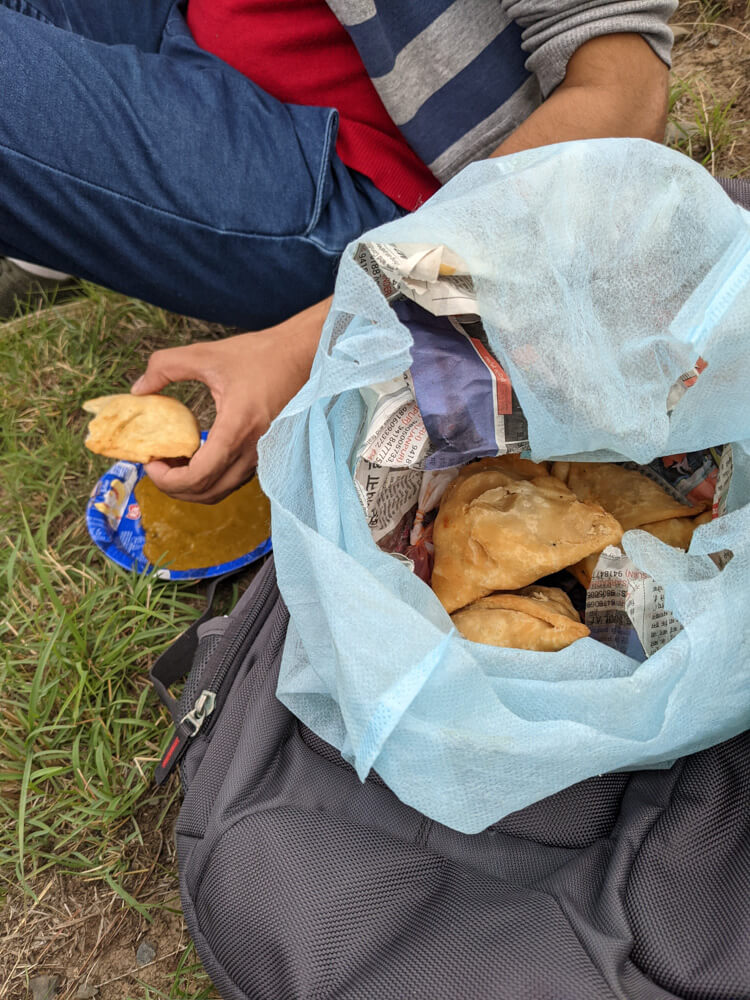
It is a quarter to six, and my battery is at twenty-six percent. Writing in the wild is like a race against time. I can get done a lot because I have to work fast. Otherwise, I have to finish the rest of the stuff at home in concrete constructions. No matter how remote the homes get I only find peace under a canopy of trees.
Moving on.
We enjoyed the wild but nothing good comes without difficulties. Trudging up unknown jungle trails may now feel natural to me but my partner gets intimidated by the uneven steep slopes filled with loose rocks or slippery pine needles. I myself fear sharp descends and need hand–holding sometimes. Our shoes are good but these are not the regular hiking ones. I lost my hiking shoe, and my partner never bought any. (You can find my guide to hiking solo in Dharamshala for more ideas on where to go in Himachal.)
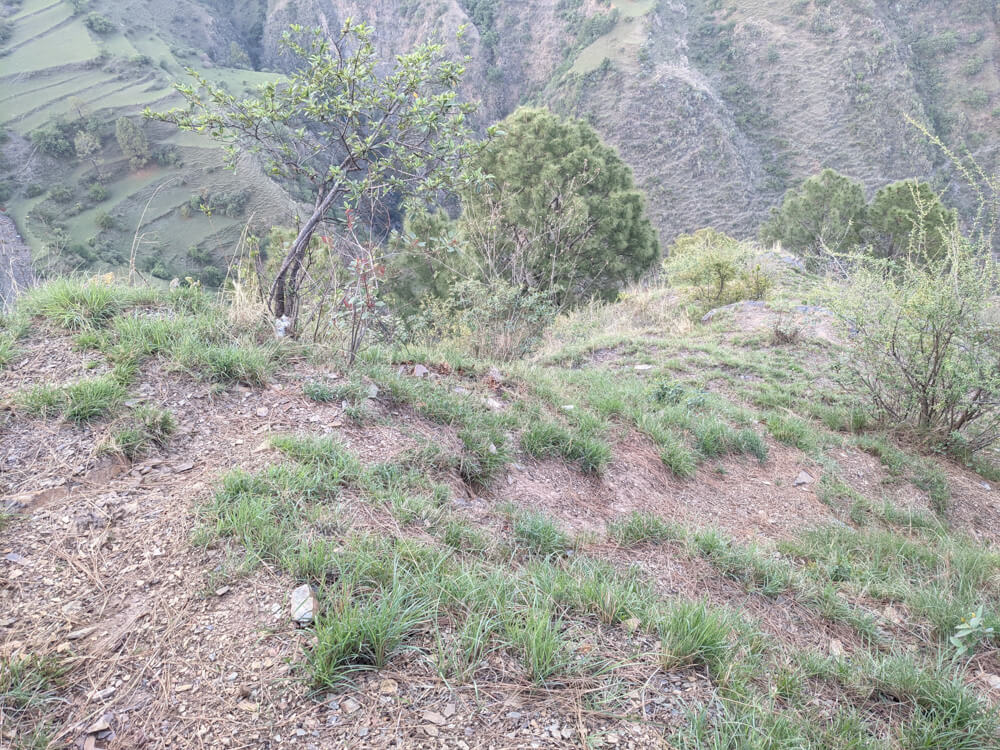

And here in these forests of the Mehli village, we don’t know when the leopard might come. Every rustle and rattle in the jungle could be a sign of the danger lurking nearby. We are assured by the villagers the wild cats don’t harm humans but we still don’t want to surprise one, especially a distrustful mother of young cubs.
We walk in daylight and make sure we don’t enter into anyone’s private land. Now on this side of the downwards slope, we know there are no homes because we didn’t see any and our hosts also haven’t warned us of any. So as long as we don’t fall into the abyss and keep away from wild animals we are good.
“One step in front, hold, put the other one now.”
“Hold my hand, partner. Okay, I am stable. Let go.”
“I am going this way. Oh you want to step onto that rock. It looks loose.”
“These dry pine leaves are so slippery my shoe is rendered useless on them. Hold me if you see me falling.”
“Did you hear a groan? What was it? Let us turn back.”
“I want to pee. Look around. Don’t pee on your shoe.”
“Done? Hey the light is fading away. Let’s go quickly.”
“Could this be the right way? Don’t touch this bush it just pierced me with its spiky thorns.”
“I don’t see a path but only these up and down grassy patches on mud that has just about enough space to keep a feet.”
This is how our conversation goes.
After discovering many directions around that downwards trail, we knew our way around. From those rocks we would turn right, step down on many of those grassy steps, and walk on a track to get to the tilla, a rocky mound from where we got a panoramic view of the valley. Once while loitering around the hillock, we had gotten into a conversation with a woman who has her house right underneath the knoll. She spoke sweetly and told us she owns the tilla jointly with her sister. The other sister, an older woman, lingered around looking at us suspiciously.
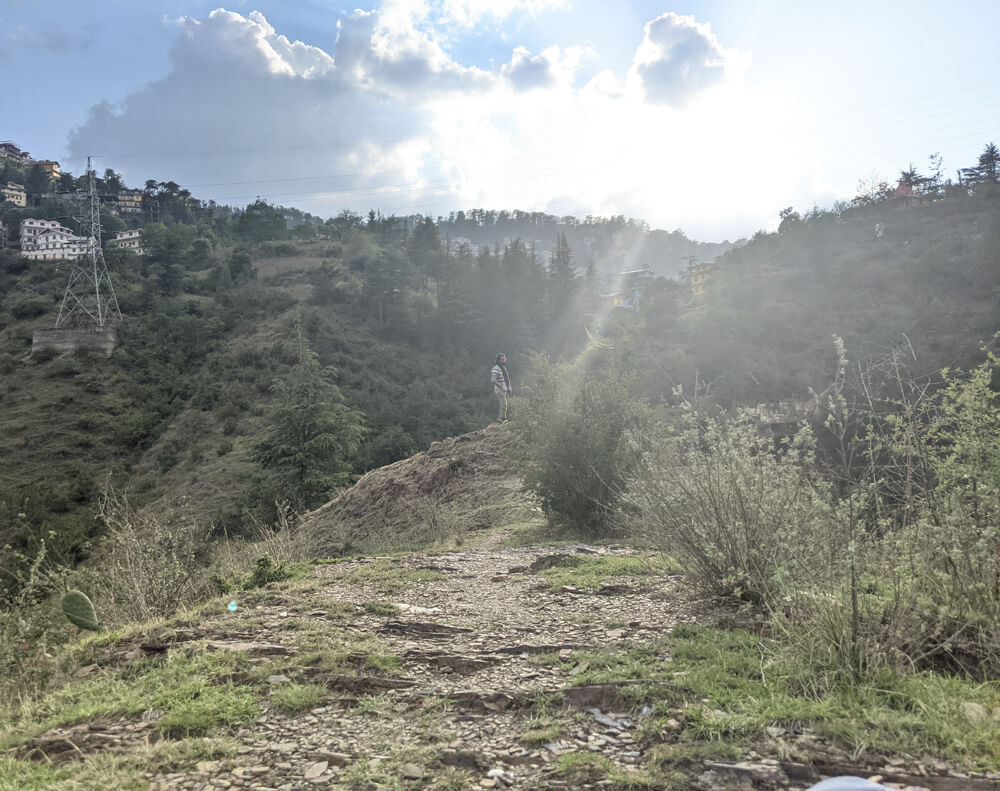
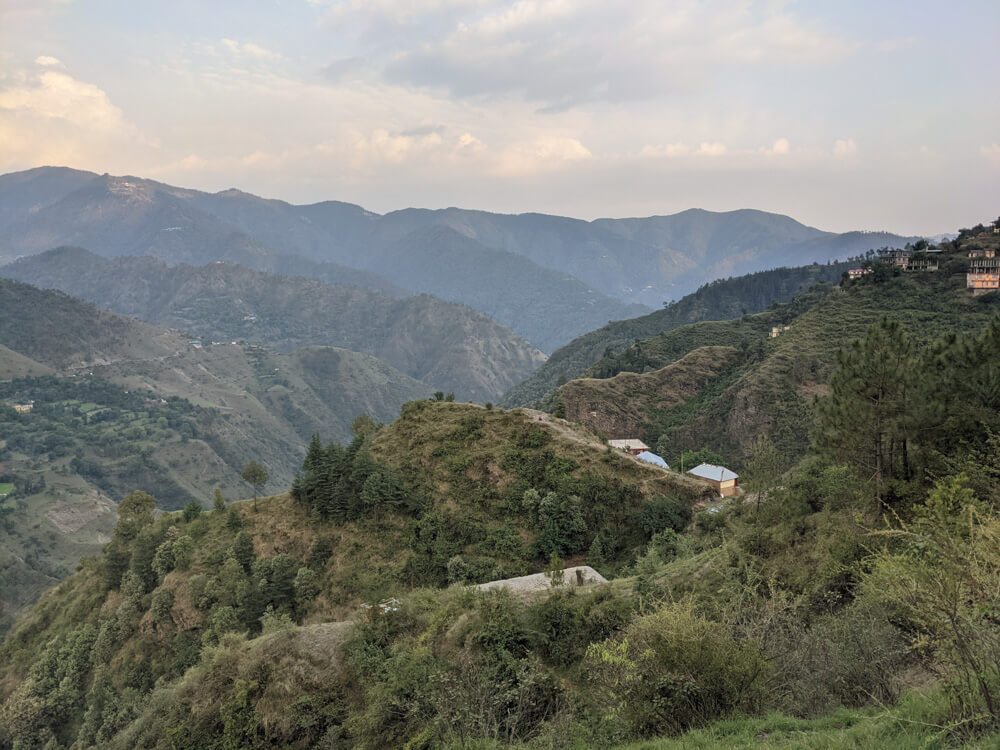
The benevolent lady told us the path to the bottom goes right from below the hillock. And that we could reach the nallah in about twenty minutes. She was so welcoming and warm that we always listened to her intently. She was the only one in those villages of Shimla who invited us repeatedly, while others always seemed too cautious about their properties and didn’t even return our warm smiles.
Maybe the lady left lonely. She said she had no one to talk to. When we pointed to broken mud and brick houses still stuck to the hillside, she informed us that the land of the houses was brought by the government for a four–lane highway. The families who had inhabited the homes had left with the money they received from the government. The four–lane would be built from right underneath the mound.
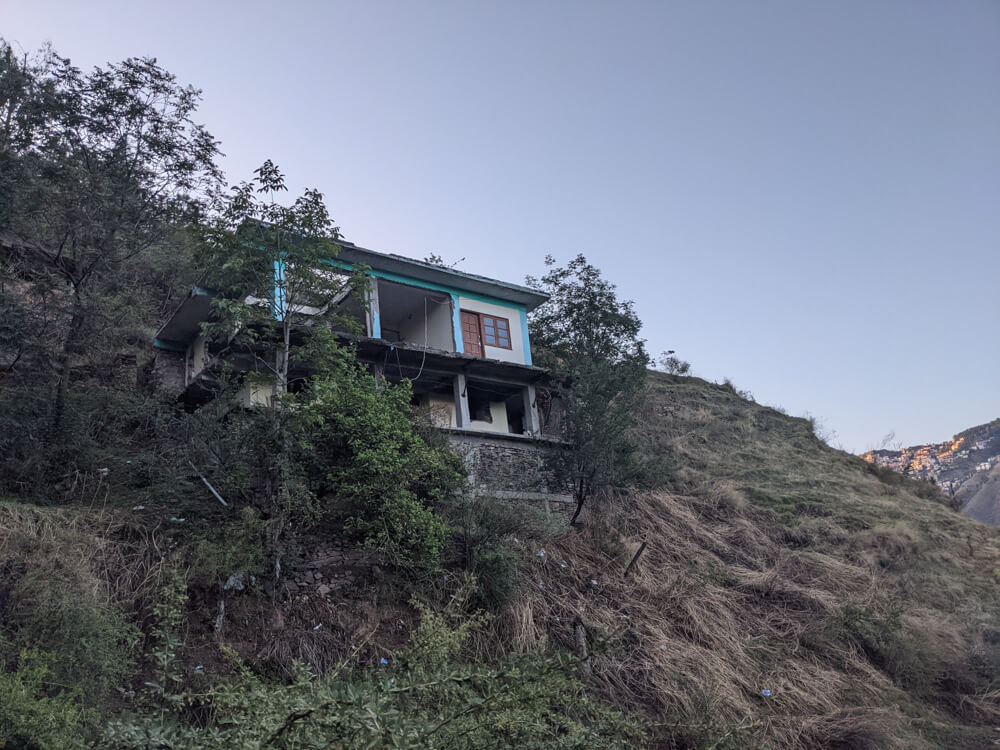
After seeing the downwards path from her tilla, we decided we would go on it to the khad. Until now we hadn’t seen a clear way to the bottom before. But now we had at least some assurance of a walkable trail. The fields and the slopes in between all belonged to the two sisters, as the kind sister told us. So we were assured we were on the property of someone we knew. Having accumulated the comfort one gets from having a plan, we relaxed in the sunset at the top of the hillock. As the light faded, we climbed up the steep rocky path that brought us to our guesthouse in fifteen minutes.
The Saturday We Couldn’t Get Down In to the Gorge
On Saturday, we packed our bags with water, bananas, tissue papers, and phones. We would see this nallah, we decided. But something happened and we got delayed by an hour. It was three pm. Now we did make our way to the tilla, but it was a bit cloudy that day. As we sat on the mound, little water drops fell on our faces. We admired the inky blue sky studded with fleecy clouds. Those were not heavy clouds that downpour for hours.
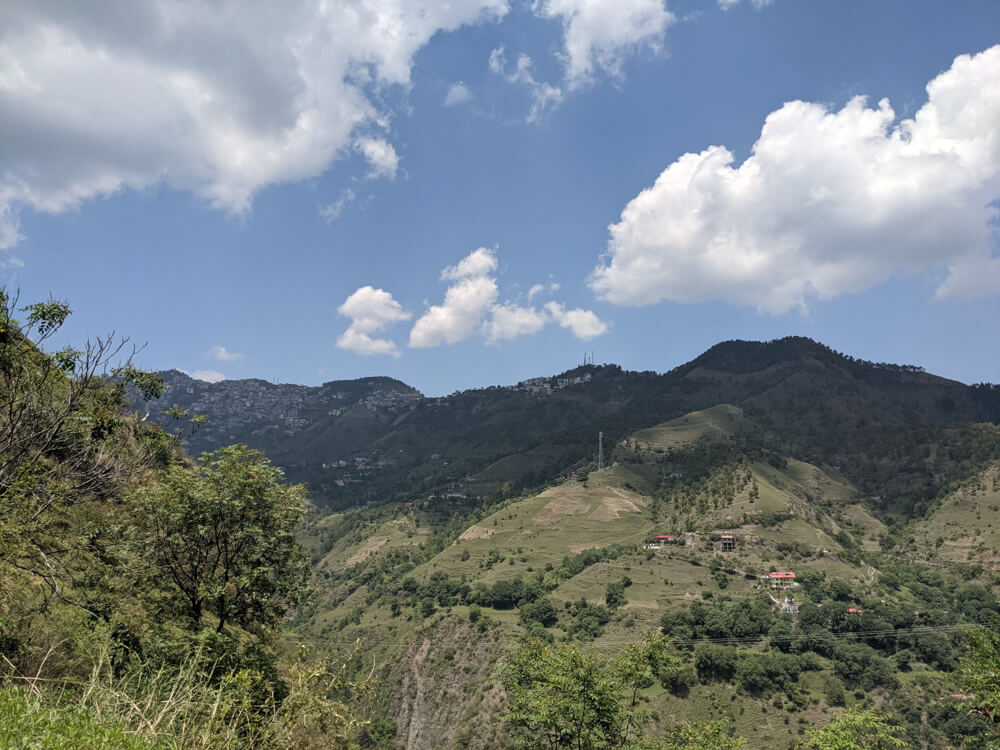
The valley shimmered neon. Pine trees shined golden in the eluding sunlight. One moment it was bright and another second it looked like the evening had already set upon. Birds chirped as they always do. The iridescent grass on the slopes was inviting, if only I was a cow. At distance, a group of cows, that first looked like horses, grazed merrily.
We thought about whether we should climb down. My husband wanted to go. We started descending downwards. Bending around the mountain, the track was mostly muddy except at deep steps where it was secured by stones. At some places the way was patted with loose rocks. Grass and dry pine needles made the course slippery.
After walking down for ten minutes, the trail curved around uncultivated fields on which tall grass swayed in the cold wind. We passed by the grassy field on which one day we had spread a bed cover and had worked for hours in the bright sun. Familiarity comforted us. But every swoosh and whoosh made us look around frantically for the wild one. Mostly it was the whistling thrush jumping around in its particularly loud manner. So we kept a watch on the surroundings, sang songs, and made sure to talk loudly to avoid surprising any wild animal.
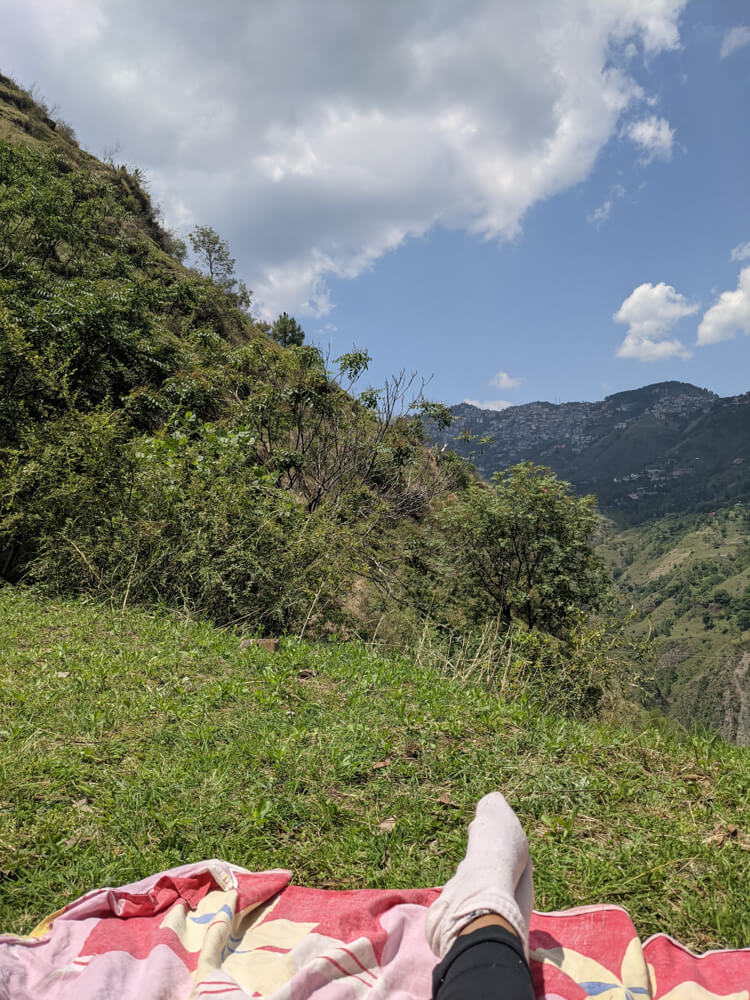
We must have been walking for fifteen minutes when we found ourselves bending underneath thick thorny bushes. At once, I heard a heavy rustle through the thickets further ahead. The sound couldn’t have been made by a bird or a monkey. Monkeys jump on tall trees. And if it was a bird it would have to be as large as an ostrich or emo.
We were fixed at our spot. One of my feet was still in the air, and I was scared to put it down else to scare the animal with the rustle of dry leaves under my foot. My partner and I signaled to each other. “What was it?” We both asked in a frenzy. “I don’t know” with a shoulder shrug was our mutual reply. We stood stupefied with our ears erect. Our eyes dilated. He said he had to pee, and I whirled around to walk back.
We clambered up the footway as fast as we could. Only five minutes later did I allow him to pee. That adventure ended much earlier than we had planned. Maybe we had almost run into a leopard or maybe it was a barking deer (locally known as kaakad) that fills these hills. Whatever it was, sometimes the only way to safety is to run away with our feet on our heads.
But we didn’t give up on our endeavor forever. The next day I got my periods, and our adventure was postponed until the next Saturday for my partner’s weekdays are controlled by external deadlines and in no way was I going alone on this jungly walk.
The Saturday We Got Down In to the Gorge, Finally
Next Saturday, we repeated the routine and started on our journey an hour earlier. Now we had seen the path up to a point and made our way there without hesitations. The mud path curled through the hill, cut through the jungle, and bent around the barren farms. Then we arrived at a lookout point from where we could see much further down the valley than we had ever seen before. In my haste, we settled on the ridge next to a cactus that bore a beautiful yellow flower. I got pricked at many places but from there we admired the scenery. (For another much-gorgeous walk through the Himalayas, read this hiking guide to Bunbuni pastures above Kalga village of Parvati.)
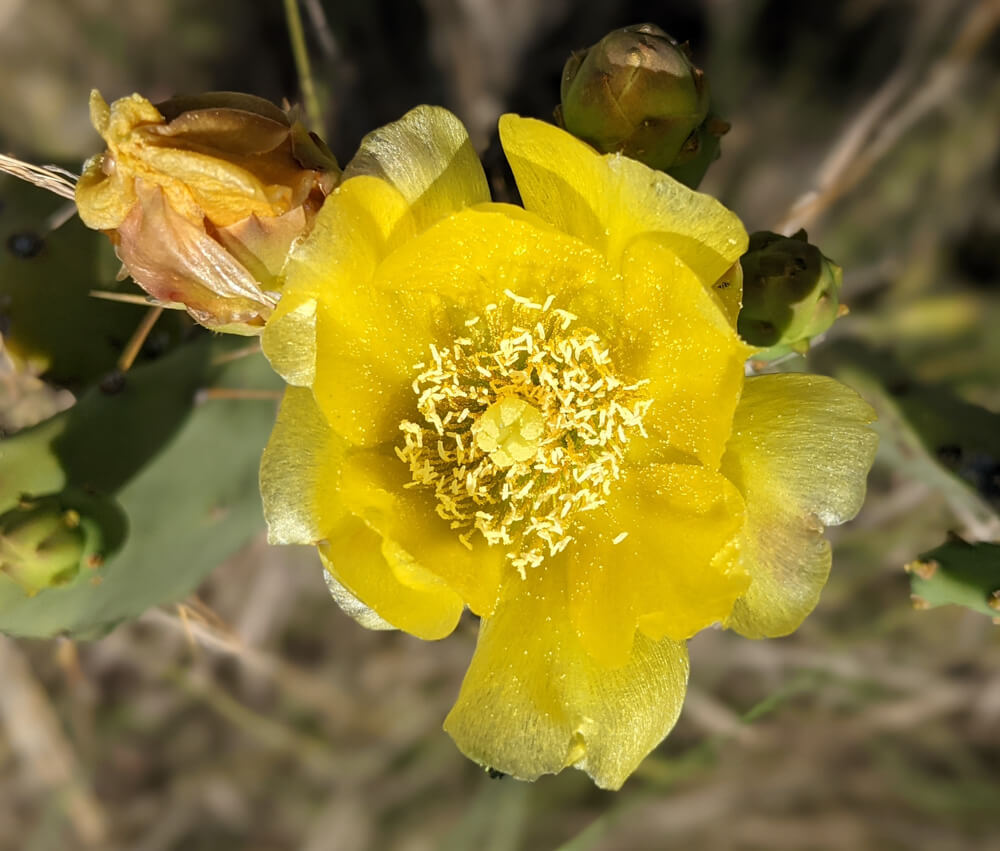
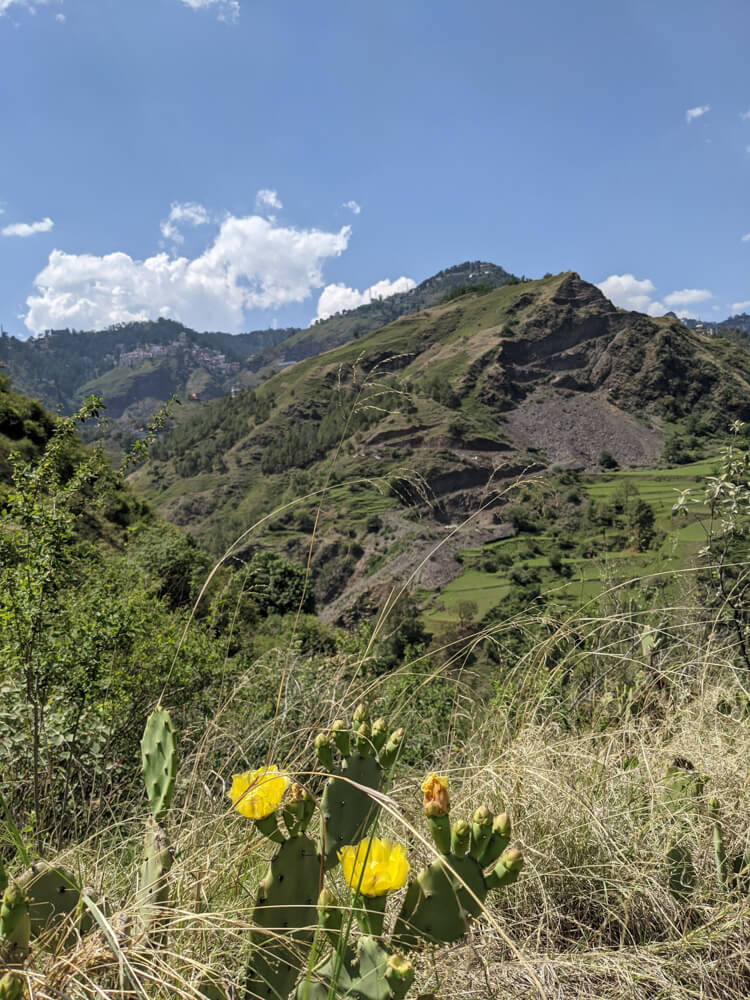
The next stretch of the journey went at a steeper angle than before. The pathways had become rockier. Holding onto trees, wild hedges, and each other’s hands we descended. We didn’t know but two children had been coming behind us all the time. When they heard our voices from ahead, they shouted hello, hello, and, in turn, we shouted, hello, hello. Once they were assured that only humans walked ahead of them, they came running like gazelles and crossed us in a second.
I knew the boys lived near our guesthouse. They both had wooden sticks in their hands but weren’t using them. Inspired by their energy and confidence that is common with the young ones, we speeded up. I assured my partner there were no wild animals around. “When these littles ones can do it we can do it too.”
I shouted out to the children to ask as if their parents knew about their gallivanting. They replied positively. Clearly, parents would have only allowed their young children to walk alone in the jungle if they were sure of their safety. So the path and the forest could be trusted. We concluded.
We had been walking for more than 45 minutes now. At a turn, we saw the brook below. Its gush was clearly audible. When we descended into the gorge, we found ourselves surrounded by a thorny jungle. In a few steps, we were at the narrow stream. The children were frolicking around hitting a round object with their wooden sticks in the manner one plays cricket. I took off my shoes and dip my feet into the cold water. We perched on the big rocks cradling the stream. There was a foul smell there and we could see plastic garbage at a distance. There must be more crap given the stench.
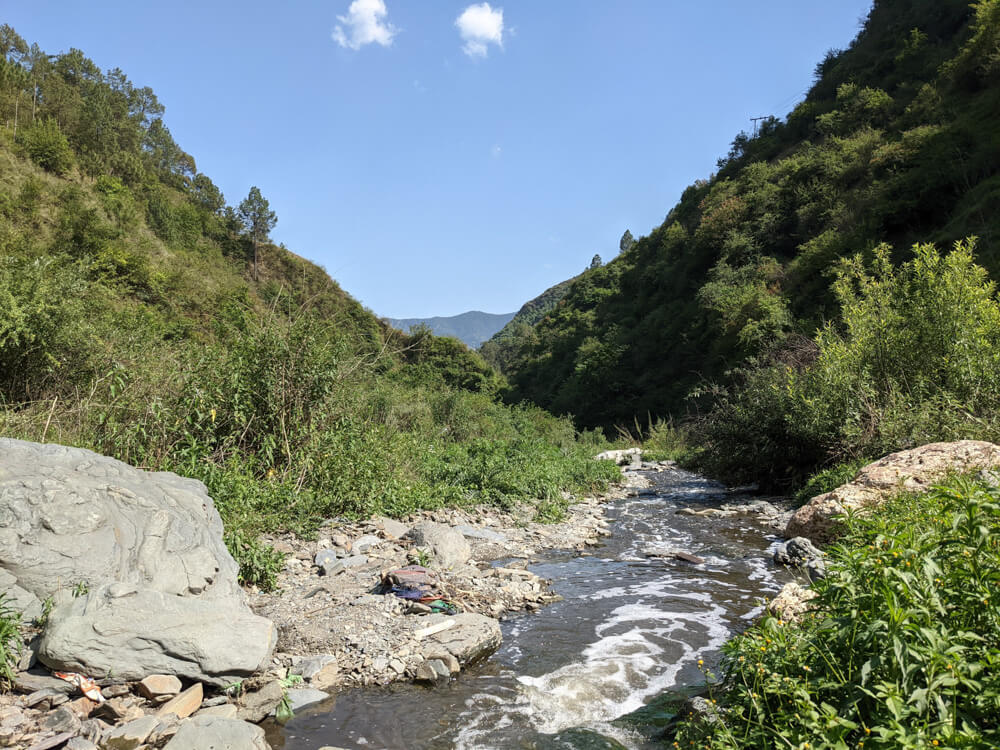
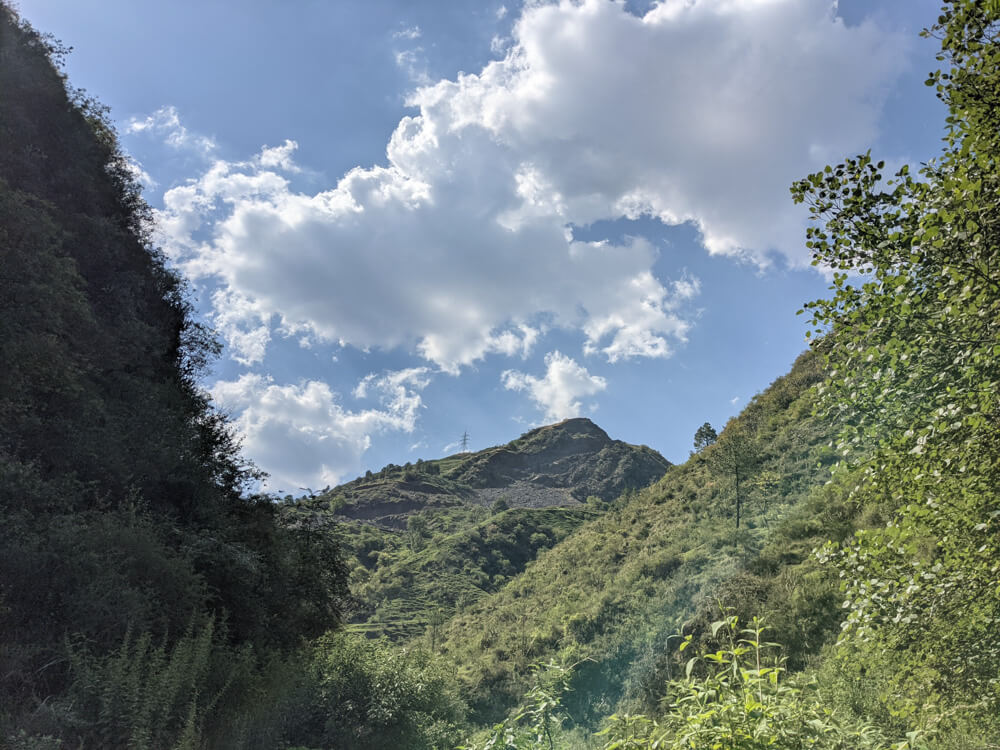
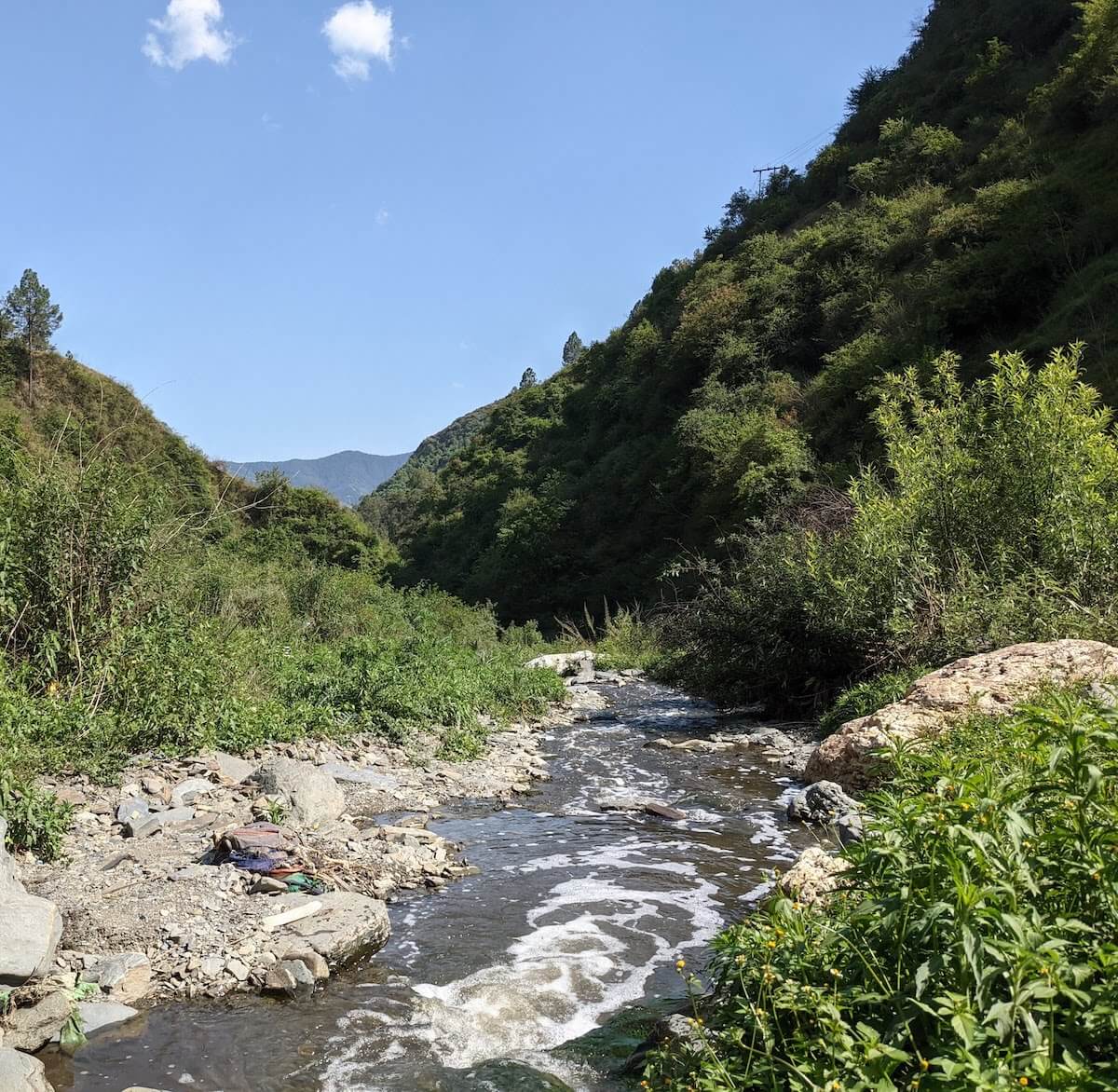
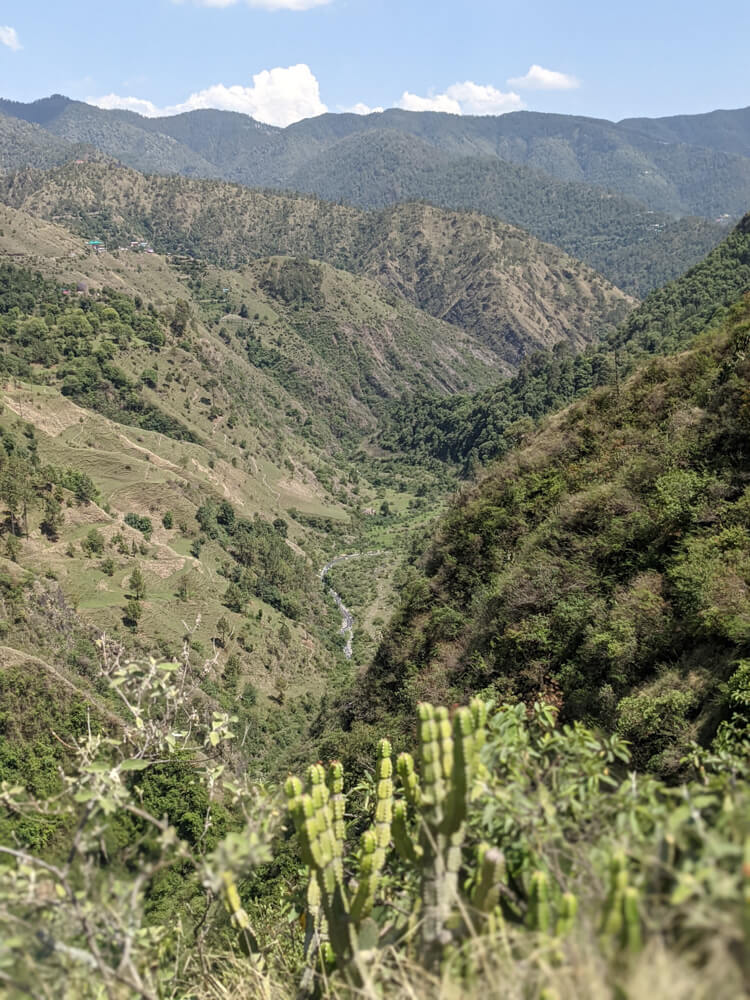
The boys went in the other direction and we decided to follow. But this stroll wasn’t amongst the shade of the pine or deodar but instead went through thick spiky bushes grown so wild that even a cat wouldn’t be able to squeeze through them. Jagged thickets covered the entire ground. Every plant was spiky. As if the forest didn’t want anyone to come there. On both sides, tall mountains loomed above us. There were tall wild trees under the hills.
There were short empty stretches between the wild bushes nearby the river. We took to those and jumped around on rocks and crossed the stream multiple times. Then the rivulet divided into two. My partner didn’t tell me then but he had declined my offer to walk further ahead because he had gotten scared. He sat down on a rock where he was. I continued on rocks, maneuvering my way through thorny plants, and admiring the azure skies. I wanted to see what lay beyond.
A group of rufous tree pies shrieked loudly on tall trees indicating they nested there. But I suddenly heard a loud rustle on the slopes nearby and when I looked closely I neither saw birds nor anything else.
The information from the mound lady that the leopards live in the caves below came to me suddenly. I turned around and almost sprinted. While rushing, I placed my step onto a loose rock and thudded down. Unluckily, my right hand landed on a prickly plant. My fingers got swollen and became red in a second as when a popcorn bag swells in a microwave. I called my partner. He was in view but out of the hearing range. I soon reached him and complained that I had been calling. He heard my story and we strode on in the direction from where we had come. It was decided we had to get out of the ravine soon and climb up.
But while walking ahead crossing the streams and the tall thorny jungle, at some point, we got lost. We had marked our landing spot by remembering a big bunch of white and yellow flowers that fill these mountains. But there were many such flower plants — who were we kidding? I checked if my phone’s location was on because then we could follow the Google location of the photo I had clicked at the giant rocks we had sat upon. But my phone’s GPS was switched off and so was my partner’s phone too.
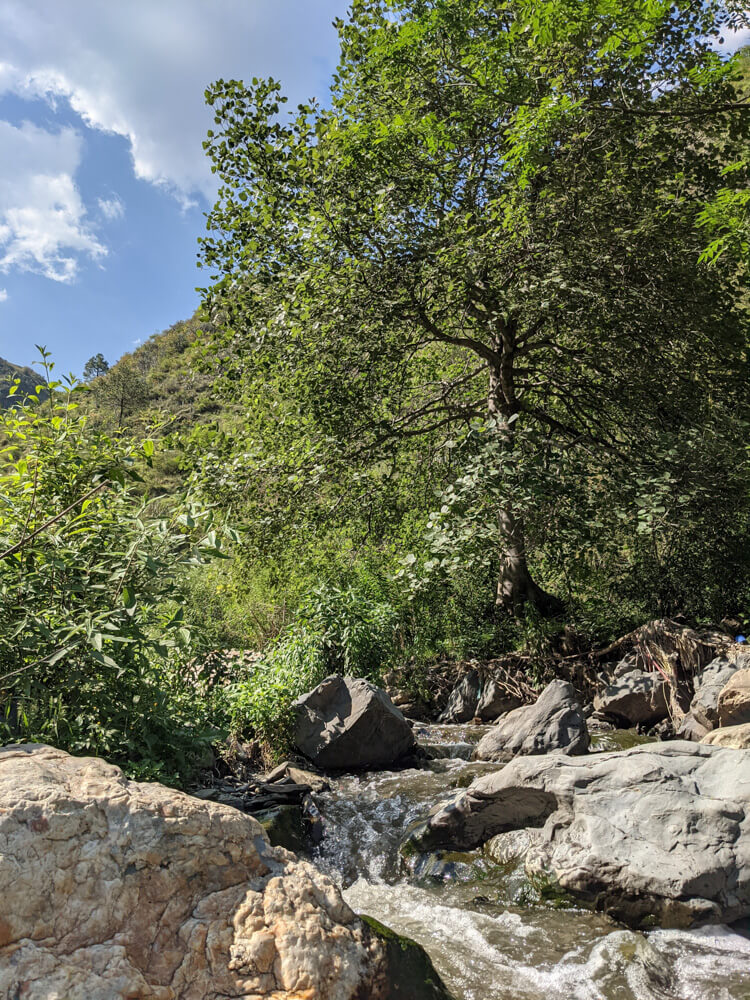
The wild grass and the bushes stood tall enough that we couldn’t see much further ahead. First, there was only one stream in that direction. Now there were two. The mountains rising above from those grounds didn’t look familiar. It was the same deodar and pine jungle on all the slopes. Phone towers rose above the hills but how were we to know which ones were of our village. The children had already left.
We were sure now that we weren’t going in the right direction as towards that side of the valley there had only been one course of stream earlier. We turned around. We could now only hope to stumble onto the path. It was 4:30 pm. Our faces were tense, and our voices creaked. Throats went dry. Getting lost in the uninhabited wild infested with leopards in the evening wasn’t the best thing to happen to someone. We feared we would have to call our host to help us. But that would have been embarrassing because they had not been the most cordial to us in the last days of our stay.
I climbed up a big rock to see if there were two rivulets where we were and did we had to cross to the other one. There was nothing on the other side of the rock except the unruly jungle.
While we were still trying to make sense of the area, we heard voices above. Four men were standing on the hill slope on the other side and motioning to us something. When we finally understood them after a while, we deciphered they wanted to know from where we had come. They were clearly surprised to see tourists wandering in that forest. We didn’t understand much of what they were saying or signaling. Giving up, they motioned us to climb up showing urgency. We also tried to signal by curving our hands to make a path that we were only climbing up and were just finding our way. They didn‘t seem assured.
Leaving them behind, we took a few more steps and saw those rocks we had settled upon in the beginning. When we came nearer we were sure of the spot. Our path was to lie on our left side. We strode on in the expected direction and found the winding trail that had brought us down.
Quickly, we stepped on and scrambled up as fast as we could. Our throats were parched but we stopped to drink water only ten minutes later. Those men left when they saw we had climbed safely. They were still enquiring from where we had come as if they found it hard to believe two strangers had made their way down into such a precarious ravine without any knowledge of it. They must have thought of us as idiots or fools. If only they knew locals had told us about the path and the place. Maybe they would have reproached the families for not pressing upon us the true dangers of the place.
At least, they were there in case we needed help. Thanking them from far with folded hands, we climbed up in about forty–five minutes. We were happy to have gone but happier to have come up safe.
Follow Up Read: Account of Living in the Beautiful Bhagsu Village of Dharamshala, Himachal
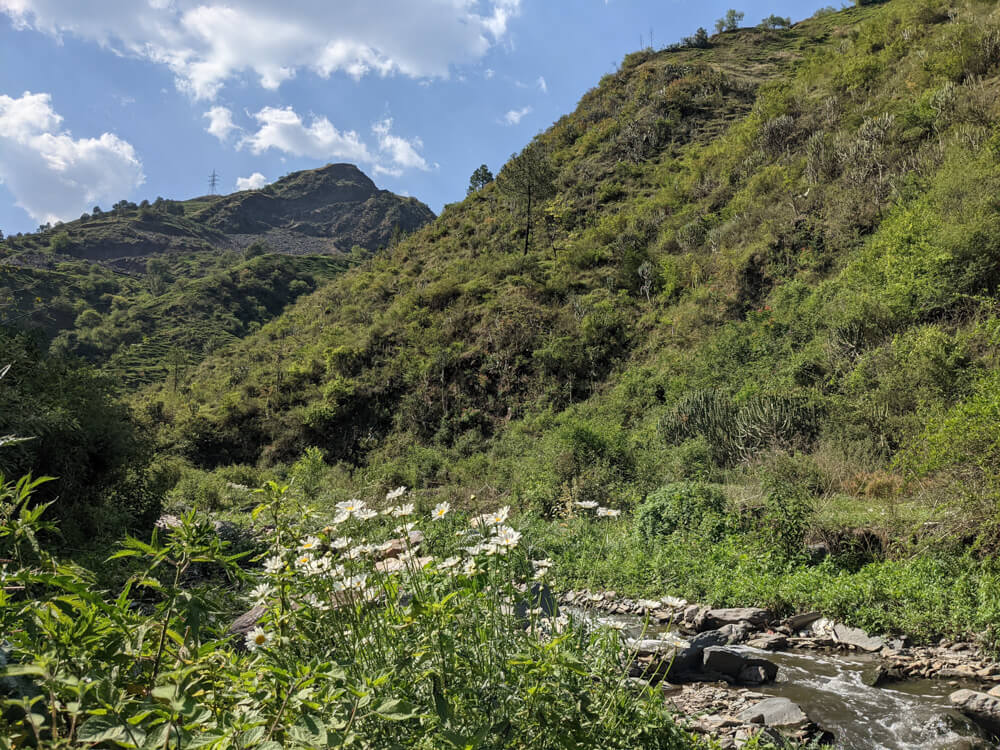
How do you find your way in the mountains? Are you the ones who explore every track or the ones who take the well–known path always? Tell me in the comments.
*****
My much-awaited travel memoir
Journeys Beyond and Within…
is here!
In my usual self-deprecating, vivid narrative style (that you love so much, ahem), I have put out my most unusual and challenging adventures. Embarrassingly honest, witty, and introspective, the book will entertain you if not also inspire you to travel, rediscover home, and leap over the boundaries.
Grab your copy now!
Ebook, paperback, and hardcase available on Amazon worldwide. Make some ice tea and get reading 🙂
*****
*****
Want similar inspiration and ideas in your inbox? Subscribe to my free weekly newsletter "Looking Inwards"!

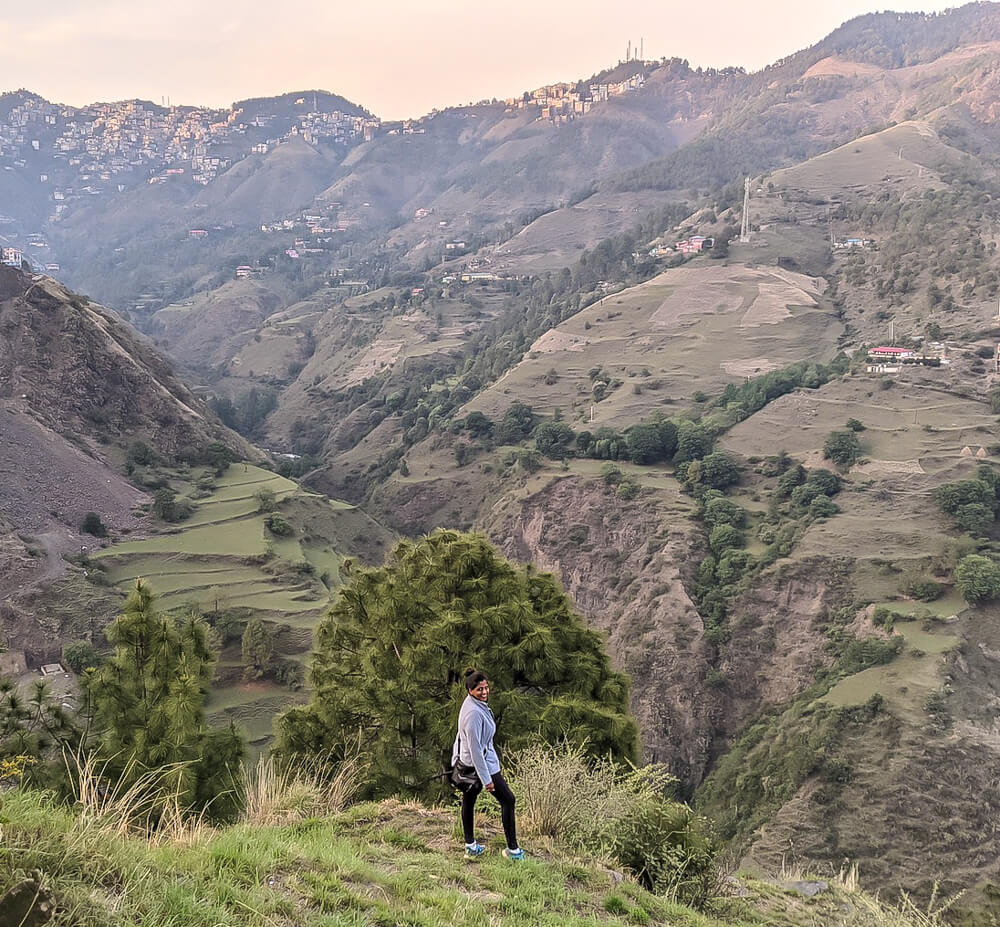
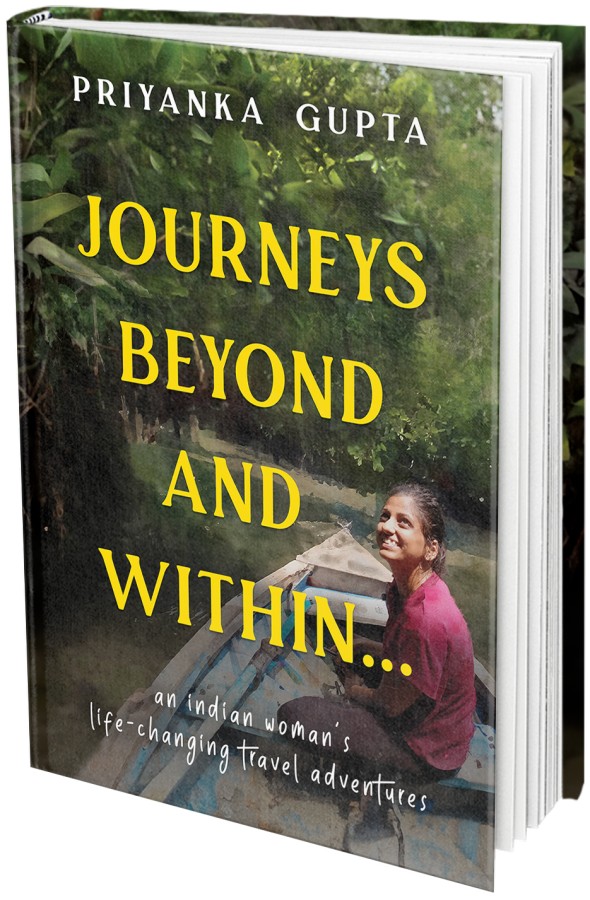
Hey I just rented out the same mehli homestay you were in for a month (25 Dec to 25 Jan) . Just yday we came and today we read your blog. And honestly I am not getting good vibes about my decision after reading your story about this village.
Is there going to be any problem with the owners or wandering nearby ?
Hi there. I was there for three weeks. Honestly you should really let your experience guide you now. My words are honest but that was my opinion and experience, right? So the people are how they are (as per how I perceived) and you can’t just go anywhere. THere are a lot of fields around so most locals just don’t like anyone going around. That being said, do ask the owners and locals where you can go and where you can’t. Someone would mention a tila nearby. One of the ladies there is really nice. If you mention us, not by name just two wanderers who hiked anywhere and everywhere, she will understand. The home-run restaurant people are also really nice. Tell them about us again (people who stayed and visited their home also and took food from the window) they will also recognize and welcome you. Hope this helps 🙂
This is the life what I want too, and if you have partner with same mindset it’s bliss and life becomes a beautiful journy, lucky you both guys who have this chance in life , by the way good writing skills you have, keep it up ??